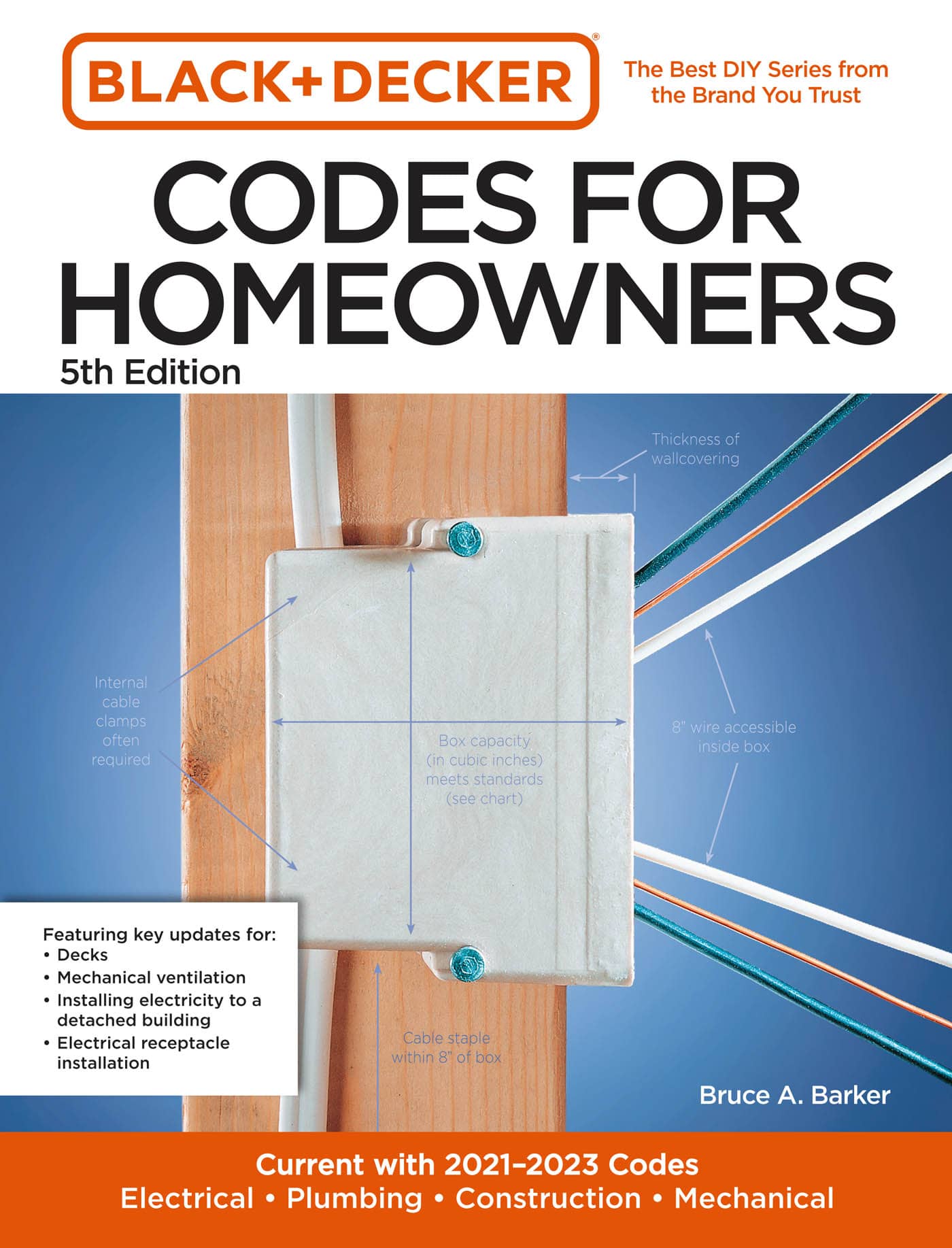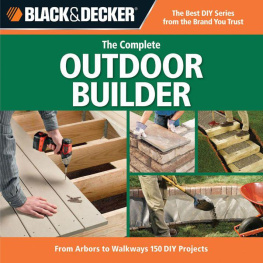Barker Bruce A. - Black and Decker Codes for Homeowners 5th Edition
Here you can read online Barker Bruce A. - Black and Decker Codes for Homeowners 5th Edition full text of the book (entire story) in english for free. Download pdf and epub, get meaning, cover and reviews about this ebook. year: 2023, publisher: Quarto Publishing Group USA, genre: Romance novel. Description of the work, (preface) as well as reviews are available. Best literature library LitArk.com created for fans of good reading and offers a wide selection of genres:
Romance novel
Science fiction
Adventure
Detective
Science
History
Home and family
Prose
Art
Politics
Computer
Non-fiction
Religion
Business
Children
Humor
Choose a favorite category and find really read worthwhile books. Enjoy immersion in the world of imagination, feel the emotions of the characters or learn something new for yourself, make an fascinating discovery.

- Book:Black and Decker Codes for Homeowners 5th Edition
- Author:
- Publisher:Quarto Publishing Group USA
- Genre:
- Year:2023
- Rating:4 / 5
- Favourites:Add to favourites
- Your mark:
- 80
- 1
- 2
- 3
- 4
- 5
Black and Decker Codes for Homeowners 5th Edition: summary, description and annotation
We offer to read an annotation, description, summary or preface (depends on what the author of the book "Black and Decker Codes for Homeowners 5th Edition" wrote himself). If you haven't found the necessary information about the book — write in the comments, we will try to find it.
Black and Decker Codes for Homeowners 5th Edition — read online for free the complete book (whole text) full work
Below is the text of the book, divided by pages. System saving the place of the last page read, allows you to conveniently read the book "Black and Decker Codes for Homeowners 5th Edition" online for free, without having to search again every time where you left off. Put a bookmark, and you can go to the page where you finished reading at any time.
Font size:
Interval:
Bookmark:


HOMEOWNERS
5th Edition
Electrical Plumbing Construction Mechanical
Current with 20212023 Codes
Bruce A. Barker

Codes for Homeowners
The purpose of the 2021 International Residential Code (IRC), and of all building codes for that matter, is expressed in IRC Section R101.3: The purpose of this code is to establish minimum requirements to provide a reasonable level of safety, health and general welfare through affordability, structural strength, means of egress, stability, sanitation, light and ventilation, energy conservation and safety to life and property from fire and other hazards and to provide a reasonable level of safety to fire fighters and emergency responders during emergency operations. This statement provides important information about building codes and code inspections. Building codes are minimum requirements. A house built to minimum requirements is not necessarily a high-quality house built by craftsmen according to best practices. Code inspections are about safety and health. They are not about fit, finish, and other cosmetic issues. They are not even about functional issues that are not specifically addressed in the code. Understanding the purpose of building codes helps you set realistic expectations about the limits of building codes and code inspections.

Building codes change; most do so on a three-year cycle. Many code changes are little more than rewording or reorganization in an attempt to make code provisions easier to understand and easier to find. Many code changes and additions are substantive, and homeowners should be aware of these as they perform repairs and remodeling projects. Substantive additions and changes are the reasons for this updated edition of Codes for Homeowners.
Trying to condense a 900-page code book that is mostly text and tables in very small print into significantly fewer pages filled with pictures and illustrations is a challenge. We have not included many code provisions, because homeowners are unlikely to use them. The provisions we include have been simplified to make them easier to understand. This means that Codes for Homeowners is not your local building code. Your local building code, as interpreted by your building inspector, is the code with which you must comply. You must do so even if you do not obtain a building permit for your work. If you have any doubts or questions about how a building code provision applies in your area, you should ask your local building inspectors. In almost every case, if you approach them as a resource and not as an obstacle, you will find your local inspectors to be friendly, knowledgeable, and eager to help.
In just the United States you will find hundreds of code books describing thousands upon thousands of building code provisions. On top of this, there are even more books that look and feel like code books but are really only attempting to describe best practices. Almost all of these have their own inherent value. But almost none of them apply to a typical homeowner living in a typical single-family home. As a homeowner and DIYer, perhaps the hardest thing about building codes is learning how to tell which one applies to you and, if there is a disagreement, which takes precedence. As an introduction, here are some brief biographies of the more common codes and enforcement agencies youre likely to encounter.
The IRC 2021 is one of an extensive collection of model building codes published by the International Code Council (ICC). A model building code is a recommended building code developed by a national organization that specializes in writing building codes. When adopted by a government agency, the IRC regulates the construction, renovation, maintenance, and repair of buildings used as homes. The IRC, by itself, has no formal legal status. A government agency must first adopt the IRC before it has any legal status in a local area.
Almost all areas of the United States have adopted some version of a building code. Some states, such as California, Florida, and New York, have a state building code. Some large cities, such as Chicago and New York City, have a city building code. Many of these state and local building codes are based on model building codes from the ICC.
Smaller cities and counties often use ICC model building codes, such as the IRC. Some rural areas may not have adopted a building code, but this is becoming a rare situation. If you do any work that is regulated by the local building code, you are responsible for knowing, or for hiring someone who knows, the applicable building code where the building is located. Ignorance of the code is no excuse.
Most building departments that use the IRC adopt local changes to the IRC. Many of these changes are minor and help to adapt the IRC to local conditions and needs. Some of these changes can significantly alter IRC provisions. The building department should publish, in writing, any changes adopted by the local government. You are responsible for knowing and complying with all local changes. Ask the building official if there are any local code changes.
The IRC is not the only building code. Others commonly used include: The International Building Code (IBC), The International Mechanical Code (IMC), The International Plumbing Code (IPC), The Uniform Plumbing Code (UPC), The International Fuel Gas Code (IFG), The National Electrical Code (NEC), and The International Energy Conservation Code (IECC). Each of these building codes regulates a different aspect of building construction.
The IBC regulates the structural aspects of all buildings, although it is not commonly applied to residential buildings. The IBC usually applies to commercial, industrial, and multi-family buildings, such as apartments. The IRC references the IBC and the IECC when a part of a residential building is not addressed by the IRC.
Each major system in a building has its own code. The IMC regulates heating, ventilation, and air conditioning systems; the IPC regulates plumbing systems; and the IFG regulates gas piping and gas equipment. These codes usually apply to commercial-type buildings. The UPC is a separate code, published by another code-writing organization, that also regulates plumbing systems. It may replace the IRC plumbing chapters in areas that adopt the UPC. The NEC regulates electrical systems. The IRC contains an adapted version of the NEC in the IRC electrical chapters. When the IRC does not address an electrical situation in a home, the NEC usually applies.
The IECC regulates energy-related aspects of all buildings. These aspects include: insulation, air infiltration, and window and door energy efficiency. The IRC contains a simplified subset of the IECC.
Font size:
Interval:
Bookmark:
Similar books «Black and Decker Codes for Homeowners 5th Edition»
Look at similar books to Black and Decker Codes for Homeowners 5th Edition. We have selected literature similar in name and meaning in the hope of providing readers with more options to find new, interesting, not yet read works.
Discussion, reviews of the book Black and Decker Codes for Homeowners 5th Edition and just readers' own opinions. Leave your comments, write what you think about the work, its meaning or the main characters. Specify what exactly you liked and what you didn't like, and why you think so.

